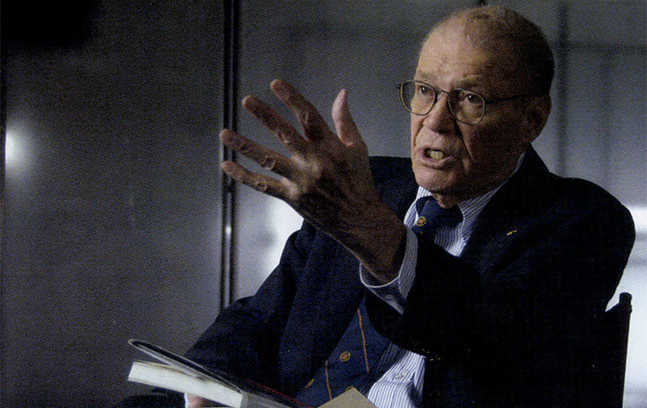Errol Morris' The Fog of War (2003)

From Errol Morris' The Fog of War: Eleven Lessons from the Life of Robert S. McNamara
by David D'Arcy
With his film The Fog of War: Eleven Lessons from the Life of Robert S. McNamara, an interview with the agonized former Vietnam War whiz that won an Oscar in 2004, Errol Morris revolutionized the American documentary. This would be a grand pronouncement, and an even grander achievement, if Morris hadn't already re-invented the documentary in the US on at least two previous occasions.
Morris was making small documentaries in the 1980s until one of those films broke the mold. The Thin Blue Line (1988) told the story of a man framed for a murder in Texas that he never committed. It was one of the age-old formulas of fictional features, but this film didn't seem to be borrowing from any images that had been on the screen before. The look of the film was as sober and minimalist as its message. Morris' reconstruction of a murder won over the critics and drew a larger-than-expected audience to a new twist on the classic tale of a man wrongly punished.
Then came Morris's most ambitious and most under-appreciated movie, Fast, Cheap and Out of Control (1997). The subject was strivinghuman and non-humanand its protagonists were meerkats, robots and topiary gardeners. The film was sui generic, yet its self-questioning reminded you of Tristram Shandy, and its skepticism about human endeavor seemed to illustrate The Myth of Sisyphus. How many films can you say this about?
The Fog of War devoted the Morris arsenal to the pained recollections of Robert S. McNamara, who weapon-ized business efficiency as US Secretary of Defense during the Vietnam War, and spent the rest of his working life atoning for it at the World Bank. More earnest than fully honest, McNamara tells Morris at the start that he skirts answering questions put to him, but responds to the questions that he wishes were asked.
McNamara wants to talk about the dangers of nuclear weapons, and does, but Morris gets him to speak eloquently about the bombing of Japan ("We killed 100,000 in one night"), and the glaring deceit and deception of the Gulf of Tonkin Resolution, which all but two US senators endorsed.
The facts are all there: We killed hundreds of thousands of Vietnamese and ravaged their country with bombs and toxic defoliants, while almost 60,000 US soldiers died--25,000 of them on McNamara's watch.
More important than the bare facts are the questions Morris poses to McNamara in what is, after all, an extended interview. Was he aware of the number of people being killed when Japan and, later, Vietnam were bombed? He was, noting that he and General Curtis LeMay could have been tried for war crimes if the Allies hadn't won World War II. Why did he agree to the job under Presidents Kennedy and Johnson? He was serving the president and his countrya wooden response if there ever was one, yet we're left wondering whether McNamara believed it.
Why did he step down? McNamara can't remember whether he quit or was fired. (The truth is that Johnson fired him.) On any lingering guilt, and on how his family was affected, McNamara won't talk. Yet, film of the war tells the story that can't be explained away. Morris makes it all look simple, pairing the truth that we now know with the way politicians and whiz-kid bureaucrats like McNamara wanted to shape it. Differentiating between the two is a crucial task of citizenship.
Is McNamara telling the whole truth and nothing but the truth? Clearly not. But there's enough of it in The Fog of War to make us question the stated motives of politicians and fear their consequences. In the current fog of the Iraq War, this is a film to be seen again and again.
